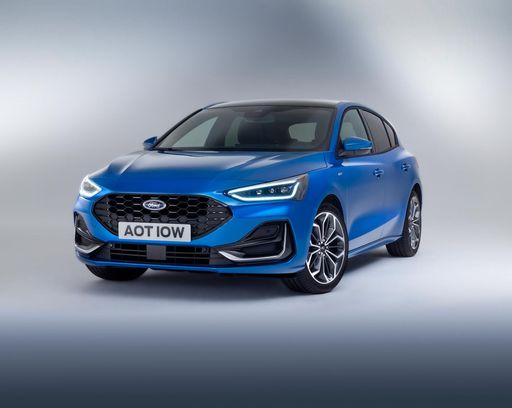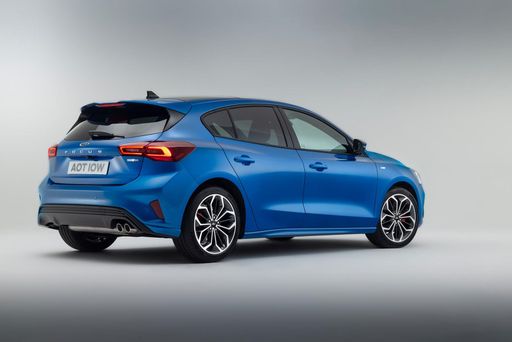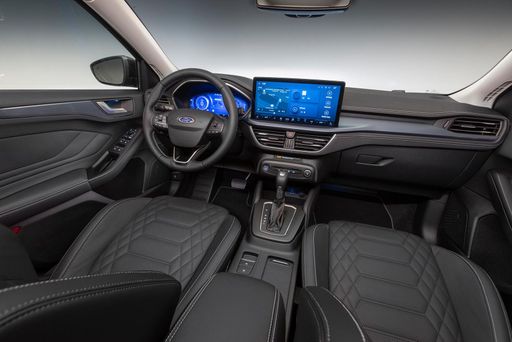Ford Focus VS Hyundai Bayon
Ford Focus
The Ford Focus is celebrated for its agile handling and stylish design, making it a popular choice among hatchback enthusiasts. Its well-crafted interior offers a comfortable driving experience with intuitive technology features. Whether navigating city streets or cruising on the motorway, the Ford Focus delivers a balanced drive with impressive efficiency.
detailsHyundai Bayon
The Hyundai Bayon is a compact crossover that effortlessly merges practicality with modern design. Its sleek exterior and spacious interior make it an ideal choice for urban settings and longer journeys alike. With a focus on comfort and connectivity, this vehicle provides a smooth driving experience paired with advanced technology features.
details @ focus.fordpresskits.com
@ focus.fordpresskits.com
 @ focus.fordpresskits.com
@ focus.fordpresskits.com
 @ focus.fordpresskits.com
@ focus.fordpresskits.com
 @ hyundai.news
@ hyundai.news
 @ hyundai.news
@ hyundai.news
 @ hyundai.news
@ hyundai.news
 @ hyundai.news
@ hyundai.news
 @ hyundai.news
@ hyundai.news

|

|
|
|
|
Costs and Consumption |
|
|---|---|
|
Price
about 27500 - 42700
£
|
Price
about 19600 - 25400
£
|
|
Consumption L/100km
4.9 - 8
L
|
Consumption L/100km
5.4
L
|
|
Consumption kWh/100km
-
|
Consumption kWh/100km
-
|
|
Electric Range
-
|
Electric Range
-
|
|
Battery Capacity
-
|
Battery Capacity
-
|
|
co2
117 - 183
g/km
|
co2
122
g/km
|
|
Fuel tank capacity
52
L
|
Fuel tank capacity
40
L
|
Dimensions and Body |
|
|
Body Type
Hatchback
|
Body Type
SUV
|
|
Seats
5
|
Seats
5
|
|
Doors
5
|
Doors
5
|
|
Curb weight
1330 - 1529
kg
|
Curb weight
1170 - 1195
kg
|
|
Trunk capacity
392
L
|
Trunk capacity
411
L
|
|
Length
4382 - 4397
mm
|
Length
4180
mm
|
|
Width
1825 - 1844
mm
|
Width
1775
mm
|
|
Height
1438 - 1482
mm
|
Height
1500
mm
|
|
Payload
495 - 560
kg
|
Payload
460 - 465
kg
|
Engine and Performance |
|
|
Engine Type
Petrol MHEV, Diesel, Petrol
|
Engine Type
Petrol
|
|
Transmission
Manuel, Automatic
|
Transmission
Manuel, Automatic
|
|
Transmission Detail
Manual Gearbox, Automat. Schaltgetriebe (Doppelkupplung), Automatic Gearbox
|
Transmission Detail
Manual Gearbox, Automat. Schaltgetriebe (Doppelkupplung)
|
|
Drive Type
Front-Wheel Drive
|
Drive Type
Front-Wheel Drive
|
|
Power HP
115 - 280
HP
|
Power HP
100
HP
|
|
Acceleration 0-100km/h
5.7 - 11.8
s
|
Acceleration 0-100km/h
11.3 - 12.4
s
|
|
Max Speed
186 - 250
km/h
|
Max Speed
176 - 179
km/h
|
|
Torque
170 - 420
Nm
|
Torque
172 - 200
Nm
|
|
Number of Cylinders
3 - 4
|
Number of Cylinders
3
|
|
Power kW
85 - 206
kW
|
Power kW
74
kW
|
|
Engine capacity
999 - 2261
cm3
|
Engine capacity
998
cm3
|
|
Top speed
186 - 250
km/h
|
Top speed
176 - 179
km/h
|
General |
|
|
Model Year
2022 - 2024
|
Model Year
2024
|
|
CO2 Efficiency Class
D, G
|
CO2 Efficiency Class
D
|
|
Brand
Ford
|
Brand
Hyundai
|
Ford Focus
A Revamped Classic: The Ford Focus
The Ford Focus has long been a staple in the compact car market, offering a blend of practicality, performance, and affordability. With the latest iterations, Ford continues to build on this reputation, introducing a series of technical enhancements and innovative features aimed at both seasoned car enthusiasts and daily commuters alike.
Innovative Powertrains and Engine Performance
The latest Ford Focus models are equipped with a variety of engine options tailored to diverse driving preferences. At the heart of the lineup are the EcoBoost Hybrid engines, which combine efficiency with performance. These mild-hybrid petrol engines are designed to deliver responsive power with a promise of reduced emissions and fuel consumption.
For those who prefer diesel, the EcoBlue engine offers a smooth and quiet ride with impressive torque and fuel economy. Meanwhile, the high-performance ST variant, powered by a robust 280 PS petrol engine, caters to drivers seeking a sporty experience.
Driving Dynamics and Comfort
One of the Ford Focus's standout features is its superior driving dynamics, balanced perfectly between comfort and agility. Whether equipped with a manual, automatic, or dual-clutch PowerShift transmission, the Focus ensures a responsive drive that adapts to both urban and highway conditions.
The vehicle's suspension system has been finely tuned to absorb road imperfections, offering a composed ride that neither sacrifices comfort nor handling precision. With front-wheel drive across the range, the Focus provides a stable and reassuring road presence.
Efficiency and Sustainability
The Ford Focus impresses with its commitment to fuel efficiency. The EcoBoost Hybrid engines deliver consumption as low as 5.2 L/100km, while the diesel variant offers an even more frugal 4.9 L/100km. These figures not only promise reduced running costs but also lower CO2 emissions, aligning with current sustainability trends.
With CO2 efficiency classes ranging from D to G, the Focus demonstrates a strategic blend of performance and environmental consideration, an important factor for environmentally conscious drivers.
Modern Design and Versatility
In terms of aesthetics, the latest Ford Focus models feature a sleek, aerodynamic silhouette complemented by modern design cues. Ranging from the sporty ST-Line to the sophisticated Titanium editions, each trim offers a distinct personality while maintaining the Focus's core design philosophy.
The Focus continues to offer practical versatility with features like a spacious 392-litre boot, making it suitable for family trips and everyday errands. The interior is smartly designed, providing ample space for five passengers and affording a comfortable, ergonomic driving position.
Technological Enhancements
Technology in the Ford Focus reflects the needs of today's connected driver. The vehicle is equipped with the latest Ford SYNC infotainment system, featuring a user-friendly interface and seamless smartphone connectivity. Driver-assist features such as adaptive cruise control, lane-keeping aid, and traffic sign recognition enhance safety and convenience.
Moreover, the Focus offers various driving modes to tailor the driving experience to different conditions, thus ensuring that drivers have both flexibility and control at their fingertips.
Conclusion: An Evolved Icon
The Ford Focus remains a dominant player in its segment, thanks to its comprehensive suite of innovative features, efficient powertrains, and dynamic styling. This model continues to evolve, providing a balanced blend of performance, economy, and technology, making it a worthy choice for those seeking a reliable yet exciting compact car.
Hyundai Bayon
Introducing the Hyundai Bayon: A New Era in Compact SUVs
The Hyundai Bayon, a compact SUV designed with urban adventurers in mind, is making waves with its exceptional blend of style, performance, and technology. The brand has pulled out all the stops to ensure that the Bayon stands out in the crowded SUV market, offering a vehicle that is both practical and innovative.
Sleek Design and Cutting-Edge Aerodynamics
The Bayon features a striking exterior design, characterised by its bold lines and angular shapes. With a length of 4180 mm, a width of 1775 mm, and a height of 1500 mm, the Bayon commands attention with its modern appeal and aerodynamic efficiency. These dimensions not only contribute to its sleek design but also enhance fuel efficiency, achieving an impressive 5.4 L/100 km.
Engine Performance and Specifications
Under the bonnet, the Bayon is powered by a 1.0-litre T-GDI petrol engine, delivering a robust 100 PS or 74 kW. This engine is available with either a manual or automatic gearbox, meeting varied driver preferences. The front-wheel-drive system complements its urban-centric design, ensuring a smooth and responsive ride.
Maximised Interior Space and Comfort
The spacious interior of the Bayon accommodates up to five passengers comfortably. The vehicle boasts a boot space of 411 litres, perfect for both everyday use and weekend getaways. The cabin is designed with practicality and technology in mind, with intuitive controls and ample storage options.
Advanced Technology and Connectivity
Hyundai has equipped the Bayon with state-of-the-art technology to enhance the driving experience. The SUV features a high-resolution touchscreen, offering seamless connectivity with Apple CarPlay and Android Auto. Safety is also a priority, with multiple driver assistance systems including lane-keeping assist and forward collision avoidance assist.
Environmental Efficiency
Despite its powerful performance, the Bayon achieves a respectable CO2 efficiency class of D, with emissions as low as 122 g/km. This balance between performance and environmental responsibility makes the Bayon an attractive option for conscientious drivers.
Affordability and Market Appeal
The Hyundai Bayon is competitively priced, ranging from €22,900 to €29,600. Its affordable running costs, estimated at 32.3 to 36.4 cents per kilometre, further enhance its appeal to budget-conscious consumers. With monthly costs ranging from €806 to €909, the Bayon provides excellent value without compromising on features or performance.
Final Thoughts
The Hyundai Bayon truly stands out in the compact SUV segment, combining style, innovation, and practicality in an appealing package. It offers a versatile driving experience suited to the demands of modern urban living, making it a top contender in its class. As Hyundai continues to champion forward-thinking design and technology, the Bayon is a testament to the company's ongoing commitment to excellence.
